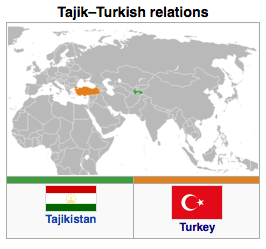Turkey-Tajikistan Relations: Limited To Bilateral Visits – Analysis
By JTW
By Gulay Kilic
In its 20th year of independence, Tajikistan is now trying to put the spotlight on its relationship with Turkey through several channels. However, there are certain factors affecting the relationship between these two countries, which could not be carried on at a satisfactory level since the 1990s. The most important factor is the Tajik civil war which started in 1992 and continued until 1997; the second, Tajikistan having remained under Russian sovereignty for a period lasting more than 70 years; and the third, Turkey’s economic and political crises and certain difficulties with respect to its foreign policy in the 1990s. As a result of the recent developments in Tajikistan, relations between the two countries today are functioning on a limited basis. Turkey’s current relationship with Afghanistan’s neighbor Tajikistan—a country that plays an important role in the Central Asian initiative—is limited in terms high-level bilateral visits.

Süleyman Demirel was the first Turkish president to pay an official visit to Tajikistan in the period following its independence. During his visit in 1995, Demirel underlined the cultural and historical relationship between the two countries and stated that he never felt like an outsider in the region. After this first visit, with the establishment of the Tajik Embassy in Turkey, relations have been relatively been strengthened. The visits of President Ahmet Necdet Sezer in 2001 and Prime Minister Erdoðan in 2003 to Tajikistan were important milestones in the development of bilateral relations. President Abdullah Gül’s trip to Tajikistan in 2009 and his negotiations with Tajik President Emomali Rahmon gave rise to several opportunities in favor of both countries. During President Gül’s visit, which was realized mainly for commercial purposes with the participation of Turkish businessmen, the determination of both parties in accelerating the improvement of relations between the two countries was remarkable.
After 2003 in particular, the trade volume between the two countries increased significantly. For example, our trade volume which was 86 million dollars in 2003 increased to 93.8 million dollars in 2005. In 2008, the total trade volume was 324.1 million dollars, and in 2010 this amount grew to 347 million dollars. The main products imported by Turkey from countries in the region are aluminum and cotton. Nevertheless, there are several fields in which Turkey can cooperate with Tajikistan. Investments and projects may be realized in fields such as energy, technology, hydropower, building trade, agriculture and metallurgy. With the intention of developing these possibilities in a safer and more stabilized atmosphere, Ankara follows several policies in order to further integrate Dushanbe into the international arena. The most important of these is the providing of development assistance to Tajikistan. Turkey had started providing development aid to the region in 1992, and has continued this policy uninterruptedly since 1997.
However, Tajikistan has not yet completed its macroeconomic development, and in the recent period, increasing pressure by the government in social and political fields shows that its security issue has not yet been resolved. As a result, the ongoing infrastructure works are endangered and the opportunities for efficient cooperation in the future cannot be properly utilized.
Among the main goals of Turkey in the region is the provision of assistance for the development and democratization of Tajikistan, a very strategic and fragile country in Central Asia. Moreover, Tajikistan plays a very important role in facilitating stability in Afghanistan as a neighboring country. When the major initiatives of Turkey in Afghanistan and its significant role with respect to this country are taken into consideration, it is understood that Ankara is an important partner which may help contribute to the socioeconomic development of Dushanbe and the assurance of its political stability. However, Turkey’s statements with regards to its support in economic and political fields are not sufficient. Since the main dynamics which determine the stability of a country are related to that country’s desire for a more stable structure, Turkey’s role in the political and economic development of Tajikistan remains limited.
Gulay Kilic
USAK Center for Eurasian Studies
Statements of facts or opinions appearing in the pages of Journal of Turkish Weekly (JTW) are not necessarily by the editors of JTW nor do they necessarily reflect the opinions of JTW or ISRO. The opinions published here are held by the authors themselves and not necessarily those of JTW or ISRO.
